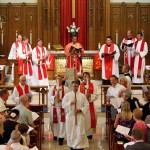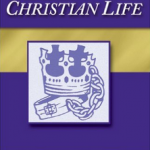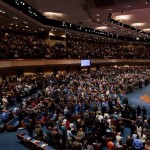This past week has been a very difficult one for people throughout the world. Nearly 150 Christian students were killed in Kenya, and around the same number of innocent people were killed in France due to attacks from radical Muslims terrorists. Since these attacks, I have seen a number of different Christian responses. Many have been overcome with anger, and fear. I confess that I felt the same anger after these attacks. But there was one particular response that I saw shared around social media which was particularly disturbing, and I think is worth a response.
Reformed baptist apologist, James White, posted the following note on facebook:
I am keeping my mouth shut about Paris and #prayforParis and all the emotions and red, white, and blue flags and icons and…all that stuff. Have to. See, I would like to discuss the issue from a Christian worldview perspective—a worldview that takes into consideration judgment, and sin, and all sorts of things that, well, folks wrapped up in emotion tend to dismiss or forget about. So I will wait a while. In our day, it takes what…a week or so before folks move on to something else and the emotions die down? Then maybe we can have a meaningful conversation about responding to such events in a consistently biblical fashion. Till then, this “cartoon” from Joann Sfar, a former Charlie Hebdo cartoonist, reminds us of the fact that French society, by and large, has no interest in God, God’s ways, God’s laws, God’s will, and, well, God in general. Might want to consider that…after all the emotions have died down, that is.
Following this post was a cartoon rejecting prayer for Paris. Now, White claims that he is going to “keep his mouth shut,” but then proceeds to give his opinion on the matter anyway. Unless I am reading this wrong (I see no other way to read these comments), White is arguing that we should discuss the attacks on Paris from a “Christian worldview,” which includes judgment and sin over the ungodly. White then proceeds to show that France is ungodly. The seeming argument here is that we must view the Paris attacks in light of the judgment of God over the people in France for heir rejection of God.
I confess to being “wrapped up in emotion” regarding this situation. In fact, I think its rather disturbing if one is not emotional about the fact that so many people have been killed. I have been particularly emotionally connected to this situation because my sister was in Paris the day of the attacks. In fact, she was about a ten minute walk from where these attacks occurred, and could have easily been a victim of these bombings. She has spent the past few days with the people in France, including many who had friends and relatives who were killed or injured. So no, I cannot speak dispassionately about this issue, but Christians are not called to be dispassionate about suffering, evil, and death.
There are so many problems with this response, but let me just begin with the basic pastoral one. Even if this were true, would this be the appropriate time to make such a response? Should I tell those grieving the loss of loved ones that their death was in fact the judgment of God? This is a basic confusion of law and gospel. When one is suffering from grief, loss, or anything else, that is not the appropriate time to preach about God’s condemnation under the law. In fact, times of grieving are a perfect opportunity to point broken people to the love and healing that comes through Christ. We don’t need to pile more law on top of law. Perhaps this is easy for White to do because he’s not personally connected to anyone involved in this situation. But his audience likely includes some in Paris, and he needs to think about how they hear this kind of talk.
The second major problem here is that White is placing himself in the position of an Old Testament prophet. Yes, God has judgment toward sin. Yes, there are times in Scripture where God punishes a whole nation for its sins. But when God does this, he sends a prophet to warn the nation of impending judgment, and then tells the prophet to speak of that judgment as it happens. Abraham didn’t have to guess about whether the destruction of Sodom and Gomorrah was an act of judgment. Unless God suddenly brings back prophets into the world who speak his word infallibly, we have no grounds for claiming any tragedy or violent act as a judgment of God.
Third, White doesn’t address the fact that there are indeed Christians in France. As I said above, my sister and a friend of hers were visiting Paris at the time of the attacks. Both of them are Christian missionaries serving in China. On the Sunday following the attacks, they attended a church in Paris. In fact, it was even a Reformed baptist church (something White should appreciate). Yes, France’s culture is largely secular, but God still preserves a remnant in that nation. Remember, God was willing to spare Sodom for ten righteous people. Surely there are more than ten faithful Christians in Paris, so why should we presume that God would judge them despite the presence of his faithful people? And how should the Christian church in France respond? Should they proclaim the comfort of the gospel, or tell their neighbors that the loss of life was the judgment of God? Also, what if Christians were killed in the attacks? Is their death a result of God’s judgment as well?
The final problem with such responses to evil in this world is that they are attempts to peer into the hidden God. We are always trying to look behind suffering, searching for some kind of easy explanation as to why suffering happens. We like to have nice and tidy answers to these difficult questions. This is why conspiracy theories are so popular. It makes sense of seemingly meaningless evil. Open theists try to answer these questions with a philosophical Theodicy that seemingly protects God from the blame when evil things happen. Others, such as White, try to answer these questions by pointing to the judgment of God, and God’s eternal decree. But, ultimately, God doesn’t give us the answer to such questions. Think about the book of Job, where Job’s friends spend he entire book trying to give him an answer to why suffering is happening. Notice that when God finally speaks to his servant Job, he never reveals the reason for the suffering Job faces, even though the readers of the book are given a glimpse of what is happening behind the scenes.
Sometimes there is no easy answer to evil. We are not called, as Christians, to give those answers. What we are called to do as God’s people is point to where God has revealed himself in Christ. Suffering victims need to hear about the healing that God has promised to this world through his Son, and Christ’s death where all the world’s sin, evil, and pain was taken by the Son of God. It is only this word of gospel which ultimately needs to be preached in such difficult times–not words of judgment.













